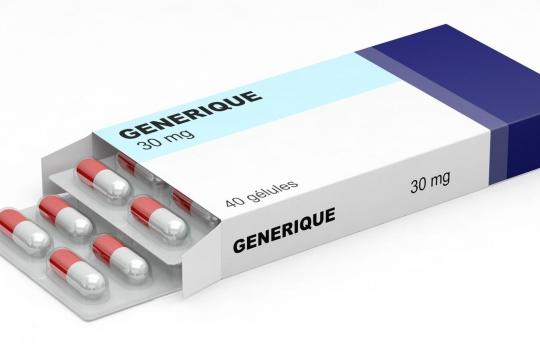Since January 1, the delivery of generic drugs has become systematic in pharmacies. For an original drug to be reimbursed, the doctor must justify this decision on his prescription according to very specific criteria.

If you hate buying generic drugs, the year is off to a bad start for you. Since 1er January, the rules for dispensing original drugs, or princeps, sometimes preferred to generics thanks to the mention “NS” or “non-substitutable” on a prescription have been tightened. The dispensing of a generic drug therefore becomes systematic, with a few exceptions. A decision that angers many health professionals.
Since 1999, pharmacies have the right to give a generic drug instead of the one prescribed on the prescription “provided that this drug is in the same generic group and that the doctor has not excluded this possibility by affixing of the handwritten mention ‘not substitutable’ on the prescription.” But since 1er January, physicians cannot add this mention to their prescription without justifying a medical reason in accordance with the criteria described in the decree of November 12, 2019.
The latter lists three “medical situations” allowing doctors to annotate the mention “non-substitutable”: MTE, EFG and CIF. “Narrow therapeutic window drugs (MTEs) concern few drugs. These include, for example, Levothyrox or drugs aimed at preventing rejection after a transplant. The second case, EFG, is that of generic drugs which would not have a pediatric form (and would therefore be unsuitable for a child). You have to imagine an original drug available in the form of a syrup but which, in generic form, would only be in the form of a tablet. Currently, this scenario does not exist, they necessarily have the same shape, so it is a situation that may exist in the future”, explains Philippe Besset, president of the Federation of Pharmaceutical Unions of France (FSPF) to 20 minutes. “The case of CIF is the most complex, it concerns proven allergies to excipients with known effects (EEN), according to a list defined by the health authorities, which we are still in the process of establishing but which concerns very few drugs,” he continued.
Some Concerns
However, if pharmacists must always offer generics, the patient has the right to take the reference medicine if he wishes. He will then no longer be able to claim third-party payment, as has already been the case since 2012. However, from now on, the “reimbursement of an insured person who does not wish, without medical justification, the substitution proposed by the pharmacist will be now on the basis of the price of the generic”, indicates the press kit of the social security financing bill (PLFSS). According to the Ministry of Health, a generic costs on average 40% less than the originator.
“Knowing that less than 10% of patients do not take generics in France, we are not in favor of this measure, which will lead to costs to be borne by patients and take up a lot of time for pharmacists with a low return for the authorities. public”, therefore fears the FSPF.
The Confederation of French Medical Unions is no more excited. “The decree specifying the conditions for the use of the mention ‘non-substitutable’, in the context of a prescription for drugs, is supposed to promote the use of generic drugs. Unfortunately, this decree runs counter to the objective pursued. It provides for precise situations limiting the use of the mention ‘non-substitutable’, with an explicit coding according to the medical situation. In addition to the non-respect of medical secrecy, this new bureaucratic drift with three new codes is unacceptable for liberal doctors. In addition, non-substitution is a situation that may also be necessary depending on the state of compliance and the patient’s compliance with treatment, and depending on the galenic of the drug”, she denounces in a press release. press entitled “The CSMF says 3 times no!”. She criticizes a “bureaucratic drift” and calls on doctors “not to get into this mechanism”.
A “citizen gesture” according to the government
For several years now, the government has been trying to increase the use of generic drugs in order to save money in the health sector. In 2016, Health Insurance even launched an information campaign on the subject in order to dispel the mistrust of the French, generally reluctant to ask for generics compared to their European neighbors.
“The generic/princeps substitution rate currently exceeds 80% in France” but the “mechanisms in favor of substitution are now showing a certain loss of momentum”, justified the government when announcing this measure in September 2018.
“We have in France a considerable lag in the use of generic drugs,” then lamented the Minister of Health, Agnès Buzyn. Recalling the effectiveness and the absence of side effects of these drugs, it likens the use of these products to a “citizen gesture”. Ultimately, “this allows Social Security to invest in very innovative drugs”, in particular to “treat cancers” in children, she assures us.
.















